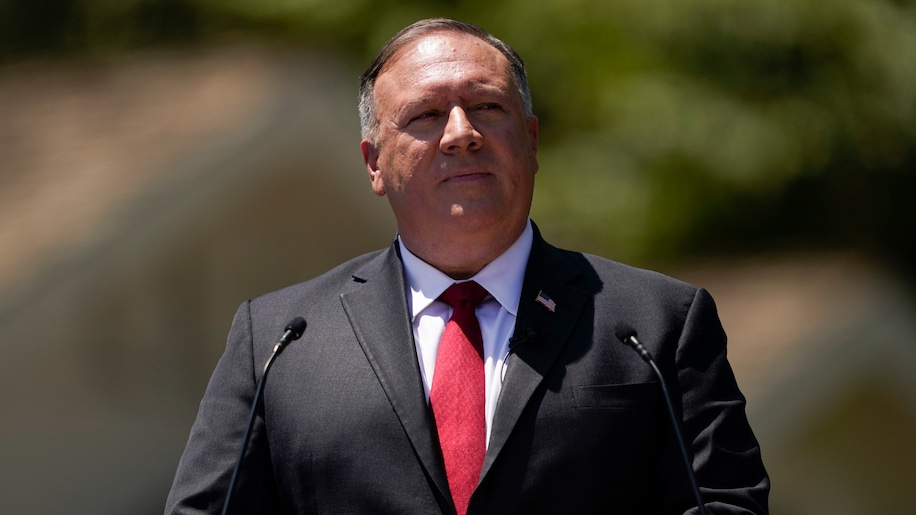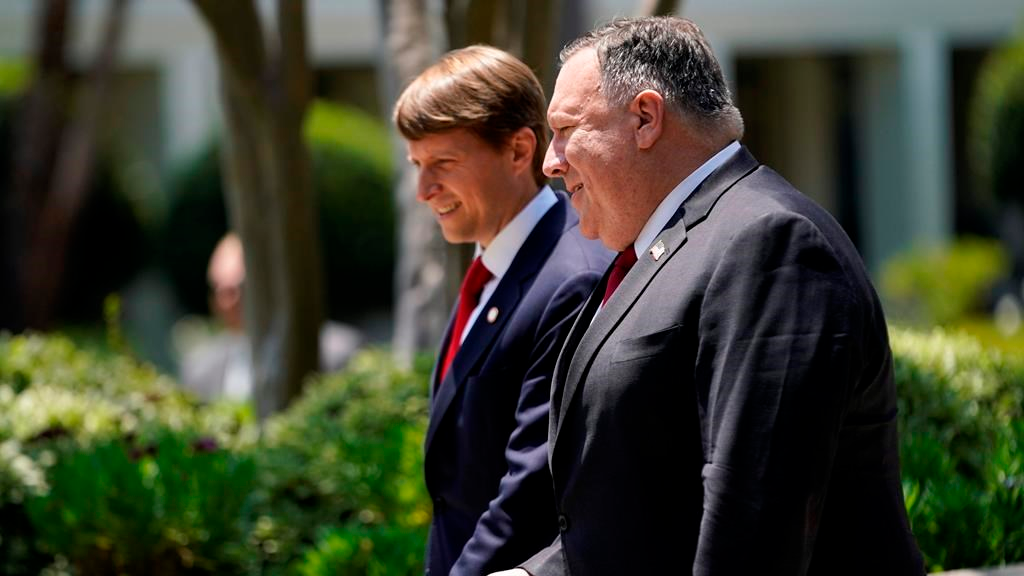
U.S. Secretary of State Mike Pompeo speaks at the Richard Nixon Presidential Library, in Yorba Linda, California, on July 23, 2020. /AP
U.S. Secretary of State Mike Pompeo speaks at the Richard Nixon Presidential Library, in Yorba Linda, California, on July 23, 2020. /AP
Editor's note: Mike Cormack is a writer, editor and reviewer mostly focusing on China, where he lived from 2007 to 2014. He edited Agenda Beijing and is a regular book reviewer for the South China Morning Post. The article reflects the author's opinions, and not necessarily the views of CGTN.
One of the many notable things about the Trump administration is its total lack of subtlety and nuance. This is not a bug but an inherent feature.
From the very start of Trump's presidential campaign, there wasn't so much a whittling-down of political finesse as taking an axe to it, from his birtherism campaign against Obama to his promise that Mexico would pay for a wall to his encouraging chants of "Lock her up" against Hillary Clinton.
There were, to be fair, a number of men and women of competence and experience who served under him, such as Rex Tillerson and James Mattis. But all such people were gradually winnowed out, as their ability to handle Trump's whims, egomania and absolute disinterest in governing declined. You can only be the adult in the room if you have the power to be; otherwise you're babysitting, and that is not a place for a cabinet secretary.
So the aggressive looking white men with shaved heads who seem to surround Trump in the White House are not outriders but a fundamental part of how he sees his presidency – bellicose, combative and as subtle as a brick.
His presidency has largely been about spats and quarrels of varying degree rather than anything substantive. Policy, administration, management – these are not part of Trump's skill set.
He would rather watch TV and pick a Twitter fight with whomever happened to be there. Sarah Huckabee Sanders, his second press secretary, claimed that Trump "fights fire with fire" and his aggressive tweets are simply him "pushing back and defending himself." Perhaps, but it's unedifying to see the most powerful man in the world engaged in such trivialities. This, it suggests, is his mental level.
But the wheels of government keep turning, and foreign policy and diplomacy constantly need recalibrating. The world is not static. So Secretary of State Mike Pompeo took to the Nixon Presidential Library on July 23 to discuss the relationship of the United States and China. The choice of venue was deliberate – it was Nixon, of course, who initiated the opening with China with his visit in 1972, and Pompeo wanted to discourse upon the relationship and the engagement strategy since then.
But as has so often been the case with the Trump presidency, pugnacity took precedence. There was no room for strategy or moral or political leadership. This was international relations as a form of temper tantrum, petulance dressed up as diplomatic discourse. What really seemed to offend Pompeo was that China did not do what the United States wanted.

U.S. Secretary of State Mike Pompeo, right, walks with Christopher Nixon Cox (the grandson of Richard Nixon), left, at the Richard Nixon Presidential Library, in Yorba Linda, California, on July 23, 2020. /AP
U.S. Secretary of State Mike Pompeo, right, walks with Christopher Nixon Cox (the grandson of Richard Nixon), left, at the Richard Nixon Presidential Library, in Yorba Linda, California, on July 23, 2020. /AP
"The kind of engagement we have been pursuing has not brought the kind of change inside of China that President Nixon had hoped to induce," he said. "We, the freedom-loving nations of the world, must induce China to change." It's as though he had never heard of sovereignty. The very idea that China might have ideas of its own and act upon them seemed beyond him.
Not content with that, he grossly generalized about Chinese students in the U.S., saying that, "We know too that not all Chinese students and employees are just normal students and workers that are coming here to make a little money and to garner themselves some knowledge. Too many of them come here to steal our intellectual property and to take this back to their country." It seems that a U.S. education is one of the foremost means for spreading American influence does not matter. Pompeo might talk elsewhere of Chinese as "a dynamic, freedom-loving people," but calling students thieves does not buttress his case.
Of course countries seek to influence each other – that's all part of international relations. But this usually occurs through diplomacy – in other words, to look for common causes and areas of common concern. The idea that one country can simply force another to obey its will without regard for its problems, history and outlook is an absurdity.
Lining up countries and condemning some for not being part of the American Way is jingoistic, simplistic and utterly unworkable. As a Manichean view of the world, it might have clarity. As a methodology for world leadership, it's calamitous.
The Trump administration has failed in every area economically, domestically, keeping the American people safe and healthy, and diplomatically. Though the death toll from the COVID-19 is a staggering indictment, it is in foreign relations that the administration's failures can be best illustrated.
The U.S. benefits from numerous interlocking alliances and agreements, from NATO to NAFTA to ANZUS, and with Japan, Israel and Pakistan. Yet Trump's overriding concern has not been to fortify these relationships but to tear them down, as though good international relations are an insult to American freedoms, rather than being their guarantor.
What Trump and Pompeo forget is that nations, too, have their own identities and self-regard. The U.S. cannot rule by force or aggression alone. Leadership comes not from military force but from example, and so Pompeo's speech, for all its peevishness and belligerence, comes across as weakness rather than strength.
It suggests that the U.S. knows it cannot influence and must resort to bullying to get what it wants. But the more the U.S. looks like a bully, the more it loses influence around the world.
(If you want to contribute and have specific expertise, please contact us at opinions@cgtn.com)